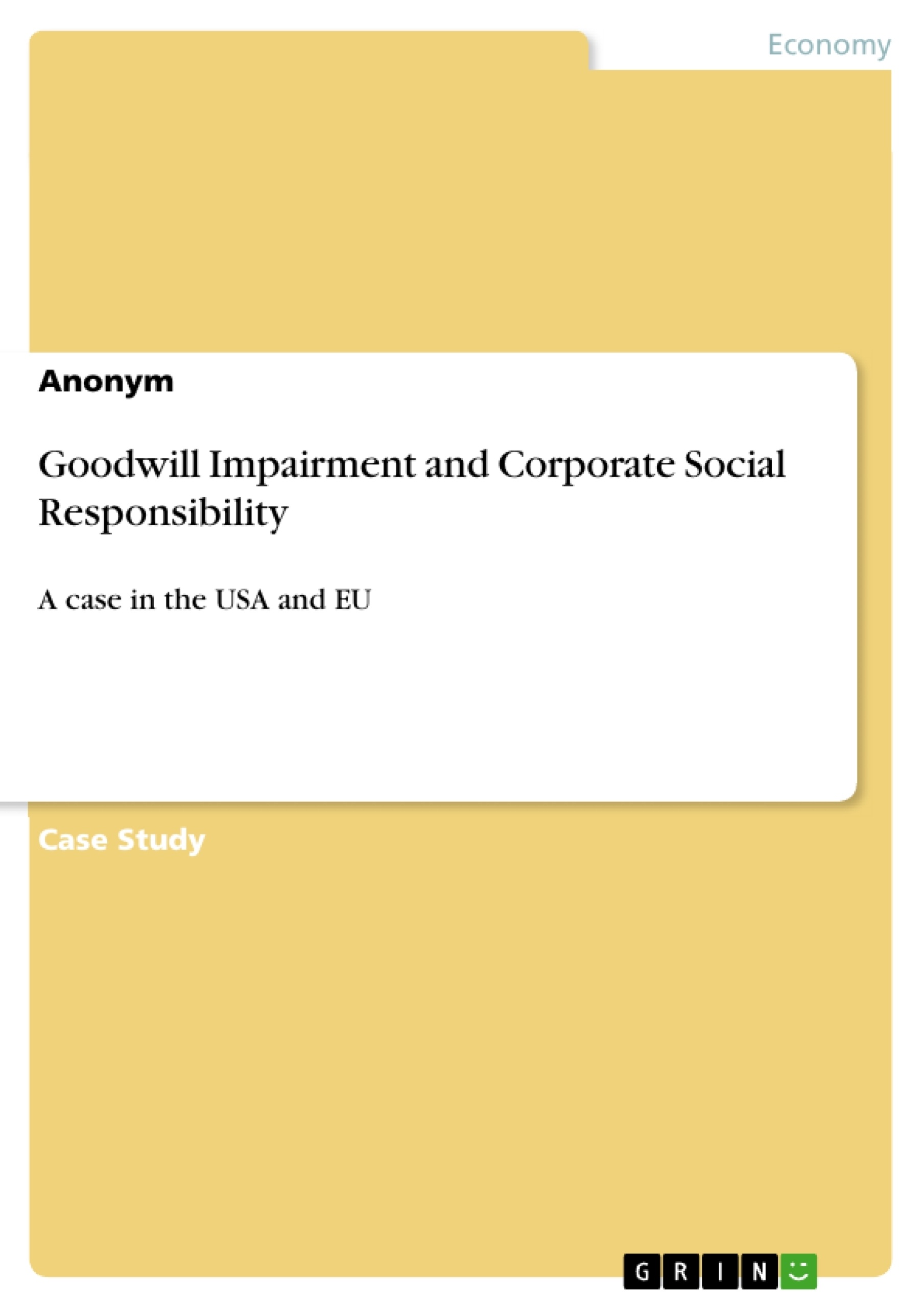The issue goodwill impairment is controversially discussed in practice and in literature because goodwill or rather the amount of goodwill which has to be impaired primarily based on managerial assumptions and proprietary information and further the recognition and accurate measurement is not easy and thus often not free from error. Therefore the International Accounting Standards Board (IASB) and the Financial Accounting Standards Board (FASB) require firms to disclose specific information on how and why goodwill arises in business combinations.
Goodwill accounting is intended to provide information on the financial consequences of mergers and acquisitions. It is therefore potentially very important for recipients of annual financial statements. Goodwill accounting in Europe is generally regulated in the International Financial Reporting Standard 3 (IFRS 3) Business Combinations and International Accounting Standard 36 (IAS 36) Impairment of Assets.
Goodwill accounting in the US is regulated in Accounting Standards Codification 805 (ASC 805) Business Combinations (formally known as Statement of Financial Accounting Standards No. 141 (SFAS 141)) and ASC 350 Goodwill and other Intangible Assets (formally known as SFAS 142). Goodwill is defined as an asset representing the future economic benefits arising from other assets acquired in a business combination that are not individually identified and separately recognised.
Besides goodwill impairment, Corporate Social Responsibility (CSR) activities has become another steadily increasing issue around the world and has gained significance in the view of public policy and management practice. CSR is often defined as “the social responsibility of business encompasses the economic, legal, ethical and discretionary expectations that society has of organizations at a given point in time.” Especially the relationship between a firm´s CSR and its firm performance, earnings quality and information asymmetry has been subject of accounting literature and research. If specific socially responsible actions tend to be negatively correlated with firm performance, managers could be cautious in this area. If, on the other hand, a positive association can be shown to exist, managers might be encouraged to enhance such activities.
Inhaltsverzeichnis (Table of Contents)
- Introduction
- Theoretical and Institutional Background
- How to determine goodwill (impairment) under IFRS and US-GAAP
- CSR Reporting
- CSR Reporting in Europe
- CSR Reporting in the United States
- The link between Goodwill Impairment and CSR
- Goodwill impairment
- Corporate Social Responsibility
- Association between goodwill impairment and CSR
- Critical Appraisal
- Evaluation of the applied Models / measurement variables
- Practical Relevance and further research
- Conclusion
Zielsetzung und Themenschwerpunkte (Objectives and Key Themes)
This seminar paper examines the relationship between goodwill impairment and Corporate Social Responsibility (CSR) activities within the context of US and EU regulations. It aims to provide a comprehensive overview of the theoretical and institutional background of both goodwill impairment and CSR reporting, analyzing the current research on their association. The paper also critically assesses the applied models and measurement variables, highlighting the practical relevance and future research needs.
- Goodwill impairment under IFRS and US-GAAP
- CSR reporting practices in Europe and the United States
- The association between goodwill impairment and CSR determinants
- Evaluation of models and measurement variables used in the analysis
- Practical implications and future research directions in this field
Zusammenfassung der Kapitel (Chapter Summaries)
Chapter two provides an overview of the theoretical and institutional framework for goodwill impairment and CSR reporting in both Europe and the United States. This includes a detailed explanation of the determination of goodwill impairment under IFRS and US-GAAP, highlighting the methods and procedures involved. It also discusses the regulatory landscape for CSR reporting in both regions, examining the frameworks, guidelines, and voluntary initiatives prevalent in each jurisdiction.
Chapter three dives into the existing research on the link between goodwill impairment and CSR activities. This section explores the potential correlations and interactions between these two concepts, examining studies and findings from both European and US contexts. Particular attention is paid to identifying factors that influence the relationship between these constructs and their potential impact on firm performance.
Chapter four critically evaluates the models and measurement variables used in studies examining the connection between goodwill impairment and CSR. It assesses the strengths and limitations of these approaches, highlighting the potential biases, inaccuracies, and inconsistencies that may arise. This chapter also discusses the practical relevance and further research needs in this field, outlining potential areas for future investigation and refinement of existing methodologies.
Schlüsselwörter (Keywords)
Key terms and concepts explored in this paper include goodwill impairment, corporate social responsibility, IFRS, US-GAAP, CSR reporting, business combinations, mergers and acquisitions, firm performance, accounting standards, measurement variables, and research methods.
Frequently Asked Questions
What is the relationship between goodwill impairment and CSR?
Research explores whether firms with high Corporate Social Responsibility (CSR) standards show different patterns in goodwill impairment, potentially indicating higher earnings quality or lower information asymmetry.
How is goodwill impairment regulated under IFRS?
Under IFRS, goodwill impairment is primarily regulated by IAS 36 (Impairment of Assets) and IFRS 3 (Business Combinations), requiring annual impairment tests instead of scheduled amortization.
What are the main differences between IFRS and US-GAAP regarding goodwill?
While both use impairment-only models, the specific steps (e.g., ASC 350 in the US vs. IAS 36 in the EU) and measurement variables for identifying and calculating the loss can differ.
Why is goodwill accounting controversial?
Because it relies heavily on managerial assumptions and proprietary information, making it susceptible to errors or intentional earnings management.
What is the role of CSR reporting in the US and Europe?
CSR reporting has gained significance in both regions, with varying frameworks and regulations that require companies to disclose their social, ethical, and environmental impacts.
- Arbeit zitieren
- Anonym (Autor:in), 2019, Goodwill Impairment and Corporate Social Responsibility, München, GRIN Verlag, https://www.grin.com/document/594567



